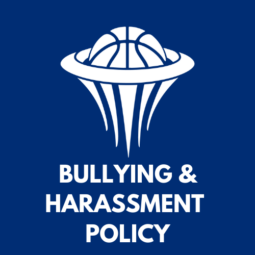Bullying and Harassment Policy

Policy Statement
Basketball Nova Scotia is committed to providing a sport and work environment which promotes equal
opportunities and prohibits discriminatory practices and bullying. Harassment is a form of discrimination, which is prohibited by human rights legislation in Canada. Bullying involves a person expressing their power through the humiliation of another person. Bullying may be a form of harassment but also has some of its own defining characteristics. The sport setting is one setting where bullying occurs. In some cases, coaches and players use bullying tactics deliberately to motivate performance and to weaken opponents. Basketball Nova Scotia supports the right of all its members, whether athletes, volunteers or employees, to participate in activities free from any form of harassment and bullying.
Basketball Nova Scotia emphasizes the importance of eliminating harassment and bullying in basketball as a key element in ensuring the safety of young participants. A sports environment, which actively discourages harassment and bullying and builds relationships based on trust and mutual respect, is an environment which discourages the abuse of children and youth and encourages the overall development of the individual. To further these objectives, Basketball Nova Scotia will make every reasonable effort to promote awareness of the problem of harassment and bullying among all its members, and to respond quickly and effectively to complaints or disclosures of harassment or bullying.
POLICY
It is the policy of Basketball Nova Scotia that harassment and bullying in all its forms will not be tolerated during any Basketball Nova Scotia activity or program. Accordingly, all Basketball Nova Scotia personnel (staff, volunteers, team or on-court officials) and partners (parents, guardians) are responsible for making every reasonable effort to uphold this commitment. Specifically, this includes refraining from harassing or bullying behaviour, responding promptly and informally to minor incidents of harassment or bullying and following guidelines for reporting or responding to more serious complaints of harassment or bullying. Players and other participants are expected to refrain from harassing or bullying behaviour and are encouraged to report incidents of harassment or bullying.
- DEFINITION OF HARASSMENT
Harassment is defined as conduct, gestures or comments which are insulting, intimidating, humiliating,
hurtful, malicious, degrading or otherwise offensive to an individual or group of individuals, and which
create a hostile or intimidating environment for work or sports activities, or which negatively affect
performance or work conditions. Any of the different forms of harassment must be based on the grounds prohibited in human rights legislation, such as race, ethnicity, colour, religion, age, sex, marital status, family status, disability, pardoned conviction and sexual orientation. Harassment may occur among anyone over the age of 12, between peers (eg: player to player of the same age group, parent to official, coach to coach) or between someone in a position of power or authority and an adult in a subordinate position (eg: coach to player, sports administrator to employee).
The following is a non-exhaustive list of examples of harassment:
- unwelcome jokes, innuendo or teasing about a person’s body, looks, race, sexual orientation etc.
- condescending, patronizing, threatening or punishing actions which undermine self-esteem
- practical jokes which cause awkwardness or embarrassment, or may endanger a person’s safety
- degrading or inappropriate hazing rituals
- unwanted or unnecessary physical contact including touching, patting, pinching
- unwanted conduct, comments, gestures or invitations of a sexual nature, which are likely to cause offence or humiliation, or which might on reasonable grounds be perceived as placing a condition of a sexual nature on employment or on any opportunity for training or advancement
- sexual assault or physical assault
It is important to note that the behaviours described in items 5 to 7, when directed towards a child or
youth, constitute abuse under child protection legislation. This may also be true of other behaviours, for
example, certain hazing practices. In such cases, the duty to report provisions of the Abuse Policy are applicable.
2. DEFINITION OF BULLYING
Bullying involves a person expressing their power through the humiliation of another person. Bullying
describes behaviours that are similar to harassment, but occur between children under the age of twelve, or behaviours between youth or between adults that are not addressed under human rights laws. Bullies are typically cruel, demeaning and hostile towards the targets of their bullying. The issue of bullying is not addressed by the law; however, bullying behaviour is similar to harassment in that it is defined as hurtful interpersonal mistreatment of a person. Bullying can be broken down into four types; physical (hit or kick victims; take/damage personal property), verbal (name calling; insults; constant teasing), relational (try to cut off victims from social connection by convincing peers to exclude or reject a certain person), and reactive (engage in bullying as well as provoke bullies to attack by taunting them). The following is a non-exhaustive list of tactics used by bullies to control their targets:
- unwarranted yelling and screaming directed at the target
- continually criticizing the target’s abilities
- blaming the target of the bullying for mistakes
- making unreasonable demands related to performance
- repeated insults or put downs of the target
- repeated threats to remove or restrict opportunities or privileges
- denying or discounting the targets accomplishments
- Threats of and actual physical violence
3. RESPONSE AND REMEDIES
It is the position of Basketball Nova Scotia that harassment and bullying cannot and should not be tolerated in any environment, including basketball. Both harassment and bullying are unacceptable and harmful. Basketball Nova Scotia recognizes the serious negative impact of all types of harassment and bullying on personal dignity, individual and group development and performance, enjoyment of the game and in some cases, personal safety. At the same time, Basketball Nova Scotia recognizes that not all incidents of harassment and bullying are equally serious in their consequences. Both harassment and bullying cover a wide spectrum of behaviours, and the response to both must be equally broad in range, appropriate to the behaviour in question and capable of providing a constructive remedy. There must be no summary justice or hasty punishment. The process of investigation and settlement of any complaint of harassment or bullying must be fair to all parties, allowing adequate opportunity for the presentation of a response to the allegations.
Minor incidents of harassment or bullying should be corrected promptly and informally, taking a constructive approach and with the goal of bringing about a change in negative attitudes and behaviour. More serious incidents should be reported to Basketball Nova Scotia immediately and complaints should be handled in a timely, sensitive, responsible and confidential manner. There should be no tolerance of reprisals taken against any party to a complaint. The names of parties and the circumstances of the complaint should be kept confidential except where disclosure is necessary for the purposes of investigation or taking disciplinary measures. Anyone making a complaint which is found to be clearly unfounded, false, malicious or frivolous may be subject to discipline.
MINOR INSTANCES OF HARASSMENT/BULLYING
This policy does not prevent an appropriate person having authority from taking immediate, informal, corrective disciplinary action in response to behaviour that, in their view, constitutes a minor incident of harassment or bullying.
REPORTING HARASSMENT/BULLYING
A person who experiences harassment or bullying is encouraged to make it known to the alleged harasser or bully that the behaviour is unwelcome, offensive and contrary to the policies of Basketball Nova Scotia. If confronting the alleged harasser or the bully is not possible, or if after confronting the alleged harasser or bully the harassment or bullying continues, the Complainant should request a meeting with an official of Basketball Nova Scotia. For the purposes of this Policy, an official is any employee of Basketball Nova Scotia.
Once contacted by a Complainant or a third party, the role of the official is to serve in a neutral, unbiased capacity in receiving the complaint and, where appropriate, assist in the informal resolution of the situation. If the official considers that he or she is unable to act in this capacity, the Complainant will be referred to another suitable Basketball Nova Scotia official.
Click the image above to for downloadable PDF.

